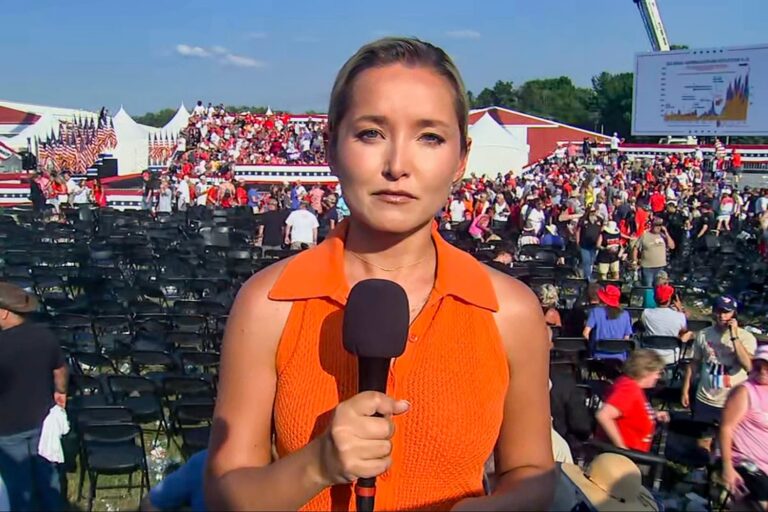As an NBC News reporter covering former President Donald Trump, I’ve attended more than a dozen of his rallies this election cycle alone, which typically have the atmosphere of a concert or festival rather than a political event, with food trucks and vendors and supporters and their families gathering together for a day of fun.
Saturday’s rally in Butler, Pennsylvania, began similarly — but, as we all know, it didn’t end that way.
A few minutes into Trump’s speech, my producer, Bianca Seward, and I heard what we thought were fireworks. But the popping continued, and when the former president stopped speaking, we instinctively ducked behind the stage set. In my mind, I thought, “This is stupid, I’m overreacting,” but my body was shaking.
It wasn’t immediately clear what the situation was or how dangerous it was. From our crouched position, we heard the crowd cheer as Trump, blood running down his face, raised his fist. We got up and ran back to the press box, reunited with the rest of the crew, who were thankfully safe, and eager to find out what everyone had seen. From there we continued covering nonstop until after 1 a.m. We were still working, which certainly delayed our own emotional response to the event.
But some things stay with me: the sounds of children screaming, a witness standing near a murdered man compellingly describing to viewers every agonizing moment, a mother telling us her adult son held her hand for the first time since he was a toddler. These are memories that are seared into people’s minds.
As reporters, we’re used to reporting on the aftermath of shootings, but in this case, we shared a common experience with our sources. Whether they were reporters or protesters, we’re just trying to understand what happened. As reporters, we also want to help others understand more. It’s been hard, but this is why we do what we do. I’m grateful to everyone who was willing to share their experiences.
When I found out what had happened, I was initially surprised that someone could bring a weapon into the rally, despite the tight security — there were metal detectors, and everyone’s bags and even wallets were checked. But I wasn’t so surprised when I found out that the shooter was outside the perimeter, because there was a lot of space behind the crowd. Of course, we’ll wait for the investigation to reveal exactly what happened.
It was unusual for Trump to jump on policy issues so early in a rally speech — he would normally spend more time warming up the crowd — but as one witness pointed out, the outcome could have been much worse if Trump hadn’t made a gesture at the screen at the exact moment the shot was fired.
The idea that a political event could lead to violence is something I’ve thought about in the past, like many people, but I never thought it would happen, or that I would be there if it did.
On Saturday, we were all focused on the news of the day. We were waiting for Trump to announce his running mate, and the Republican National Convention starts this week. Political violence was the furthest thing from my mind. But it won’t be any time soon.
Since 2019, as I’ve traveled around the country talking to voters, I’ve felt a growing sense of sadness and despair about the polarized state of our country. What happened on Saturday is a most frightening testament to that prospect. But I hope this is the peak of that polarization, not just another tragic episode in our increasingly troubled political reality.

